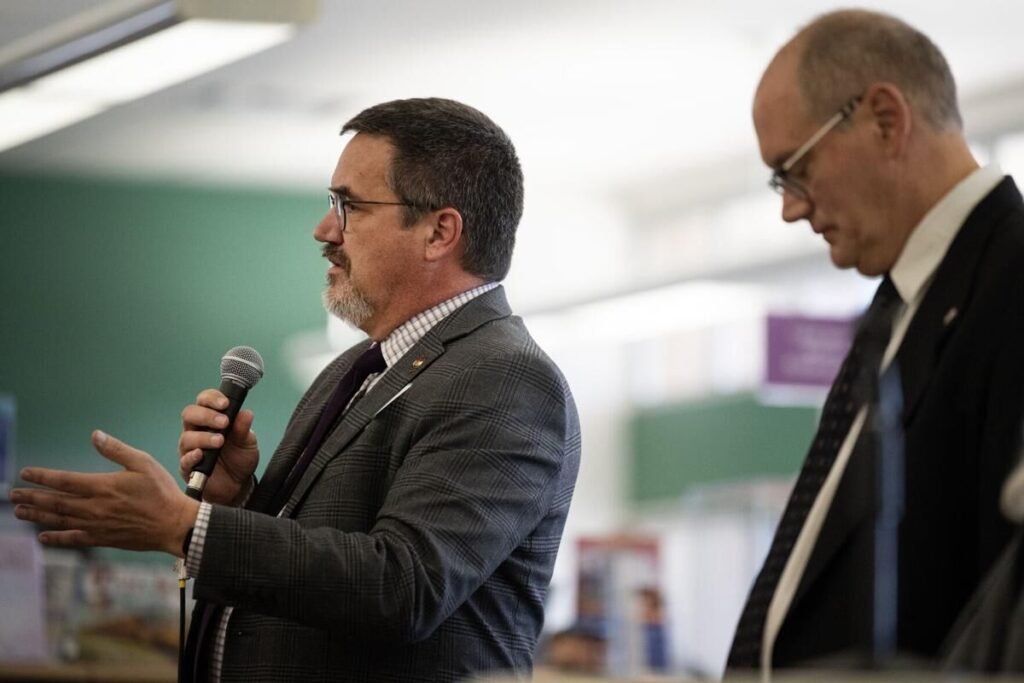Judicial department to legislators: Discipline commission ‘inaccurate’

The commission that investigates and disciplines Colorado judges was “inaccurate” several times last month when characterizing to legislators difficulties it was having with the judicial department, according to a letter the department sent Monday to lawmakers.
In a 10-page letter to the legislature’s interim committee studying potential changes to how judicial discipline happens, State Court Administrator Steve Vasconcellos described how the department — and by extension the Supreme Court — has cooperated, even to the point of helpfulness, with each of several inquiries into allegations of widespread misconduct.
And, short of saying commission members lied, Vasconcellos said suggestions otherwise by the Colorado Commission on Judicial Discipline are “inaccurate.”
“Many of the Commission’s statements about recent events are missing important background and context and are not consistent with the department’s understanding of events,” Vasconcellos wrote the legislators, according to a copy of the letter obtained by The Gazette.
“My intent in providing these responses is not to attack the Commission or say who is right or wrong in these matters,” he wrote. “However, to the extent that the Interim Committee is identifying problems in the system that need to be fixed, it is important to present additional context and explanation.”
Vasconcellos noted that commission-member assertions the department did not “feel the need to comply” with a subpoena for documents and information, or had ignored them, are “wholly inaccurate.”
Nor did the department challenge the commission’s subpoena authority, as commissioners told the committee in a hearing last month, the letter says.
In fact, Vaconcellos wrote, the department had been working diligently with the commission over months to cooperate and some of the snag was in the paperwork of agreements or ensuring it was not risking any legal liability, not in any desire to be obstructive.
“Contrary to the Commission’s Report and testimony, the Department is not aware of any discussion or communication in which the Department questioned or challenged the Commission’s subpoena authority or indicated it would not comply with a subpoena,” Vaconcellos wrote. “The need for a subpoena stems from prior agreements of the Department that do not permit disclosure of information to any third party ‘absent a valid subpoena or court order.'”
The commission shot back its own retort at Vasconcellos’ letter late Monday: “The Commission stands behind its prior statements. The Judicial Department and the Colorado Supreme Court have not always given the Commission ‘unfettered access’ to information, records, and other requested materials.”
It said it was “optimistic” that proposed reforms and the interim committee process would “strengthen Colorado’s judicial discipline process.”
The letter is the latest in a tense back-and-forth relationship between the commission, which currently sits beneath the Supreme Court, and the department that began when news of the scandal broke in February 2021.
It was alleged — and since determined to be inaccurate by investigators hired by the department — that a former high-ranking department official was awarded a multi-million-dollar contract in order to silence a threatened tell-all sexual discrimination lawsuit. The threat was bolstered by a two-page memo read, in part, to the court’s chief justice in which the undisciplined misdeeds of judges and others was laid bare.
The commission at the time noted how many of the allegations in the memo involving judges were not among its investigative files. While some items were later determined to have been reported to the commission years earlier, several items remained unreported.
The normally secretive commission has publicly described being forestalled by the department in its efforts to investigate the allegations of the memo as well as the conduct of the sitting Supreme Court justices, who apparently were aware of the contract and the circumstances surrounding it.
On Monday, Vasconcellos wrote that the department believes it’s time to set the record straight.
“Up to now, the Department has viewed these matters as confidential under the Constitution and related state law and has felt unable to respond,” he wrote. “The Commission clearly interprets the law differently, and it is now a disservice to the Department, the Supreme Court, the bar, and the public to not address some of the Commission’s statements.”
Vasconcellos wrote that the commission was also “inaccurate” when it told legislators the Supreme Court was hindering its investigation into the developing scandal by refusing to pay special investigators the commission hired. The problem wasn’t the court, Vasconcellos wrote; it was the commission wanting money it couldn’t defend.
“The Commission has asserted that the Department limited or attempted to limit the scope of special counsel assignments. Again, this is not accurate,” Vasconcellos wrote. There were “legitimate concerns with the Commission’s failure to follow defensible procurement processes and the Commission obligating an unknown (and unbudgeted) amount of attorney registration fee revenue at hourly rates nearly double the reduced government rates typically used, without any cap or other cost containment measures.”
Lastly, Vasconcellos noted how commission members wrongly told legislators that the Supreme Court is aware of every part of the judicial disciplinary process. It is not, he said.
“More specifically, in the last interim committee hearing, the Commission stated that the Supreme Court is briefed often on the proceedings pending before the Commission,” he wrote. “That is inaccurate. … The rest of the Court learns of these allegations only if a recommendation from the Commission for public discipline or request for temporary suspension is filed with the Court.”
The interim legislative committee was formed after the General Assembly passed a bill granting independent funding to the commission. Its purpose is to study more than a dozen aspects of how the judicial discipline process works — or doesn’t — and to make recommendations for change, including a voter referendum to change the Colorado Constitution.
The commission is created by the Constitution and any changes to its structure can only occur with a public vote. It is a 10-member commission, four appointed by the court’s chief justice and six by the governor.
The commission has recommended several changes to how it operates, a number of them that the department endorses.
Some are not quite to their liking, including an evaluation to make the judicial discipline process more public and transparent. Currently, discipline is kept secret unless the conduct is so abhorrent that a judge is to be dismissed, and that is with the approval of the Supreme Court. That has happened at least twice in the past few years, including one judge convicted of a felony and another judge for openly racist remarks.
The department, however, said it was open to discussions, but those should take a measured approach to making things transparent to the public.
“This decision involves significant policy decisions that have to be made thoughtfully to balance accountability, transparency, and to ensure that the discipline process is not used as a political or retaliatory tool,” Vasconcellos wrote.













